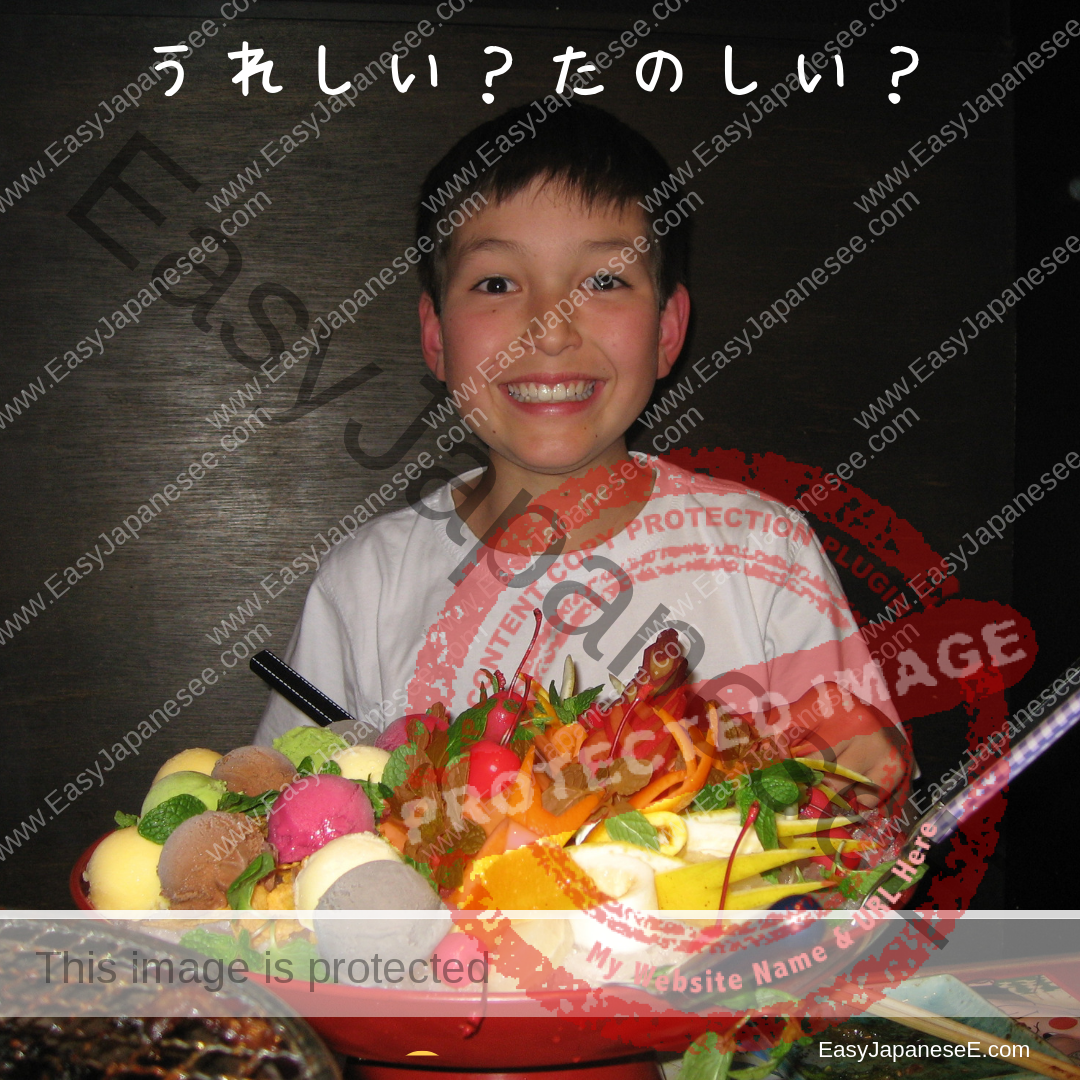A while ago, I wrote a post titled how to say “happy” in Japanese and I listed うれしい and たのしい as a word to express a transient happy feeling and I said I would need to write about the difference between the two. I did write a post but I wasn’t too happy with it, so I have decided to re-write it.
うれしい is for MY transient happy feeling caused by a specific trigger
うれしい usually needs a specific “trigger” that makes/made the speaker happy while a happy atmosphere must be evident with a sentence with たのしい.
I won a lottery. I’m happy.
(✓)宝くじが当たった。うれしい。
(✖)宝くじが当たった。たのしい。I’m happy because I passed the text.
(✓)テストに合格して、うれしかった。
(✖)テストに合格して、たのしかった。I’m happy because my mother has recovered from in illness.
(✓)母の病気が治って、うれしかった。
(✖)母の病気が治って、たのしかった。
たのしい is for a happy atmosphere, so it is less transient than うれしい
I went on a camp and I was happy.
(✓)キャンプに行って、たのしかった。
(?)キャンプに行って、うれしかった。(This is not wrong if the story continues as to the moment that made me happy but if it’s presented on its own, it sounds a bit awkward.)
(✓)キャンプに行けて、うれしかった。(= Being able to to on a camp made me happy.)Although there was an annoying incident, I was generally happy.
(✓)嫌なこともあったけど、全体としてたのしかった。
(✖)嫌なこともあったけど、全体としてうれしかった。A happy school life.
(✓)たのしい学校生活
(✖)うれしい学校生活I was happy to be invited to the party, but I wasn’t happy (=didn’t enjoy it) at all.
パーティーに招待されてうれしかったけど、ぜんぜんたのしくなかった。
Just like the last sentence above, たのしい can also be used to describe an event or a venue to mean “fun” or “enjoyable” rather than “happy”
School is fun.
(✓)学校はたのしい。
(✖)学校はうれしい。The party was enjoyable.
(✓)パーティーはたのしかった。
(✖)パーティーはうれしかった。
So, this boy in the picture can say both but the meaning can be slightly different:
(A)アイスクリームがたくさんあって、うれしかった。(= With a lot of icecream, I was happy.)
(B)アイスクリームがたくさんあって、たのしかった。(= With a lot of icecream, the event was a happy one.)
Similarly, the following pairs are both correct but the messages conveyed are different.
(C) 日本が勝って、うれしかった。
(D) 日本が勝って、たのしかった。
(C) simply means “I was happy that Japan won.” That describes my own happy feeling. (D) suggests that I was surrounded by other people when Japan won and the atmosphere there was a happy one.
(E) 先生からうれしい手紙をもらった。
(F) 先生からたのしい手紙をもらった。
In both (E) and (F), I received a letter from my teacher but the letter described in (E) had a “good news that made ME happy” like “I topped the class” or “the teacher is getting married.” On the other hand, the letter described in (F) has “something amusing not only to me but to everybody.” It could be full of emojis or with an amusing illustration.
Neither うれしい nor たのしい can be used to describe somebody else’s feeling
Just to make sure, please let me remind you that most adjectives for emotions are used only for “MY (= speaker’s)” feeling unless you are writing a novel or narrating a story. If you are trying to talk about somebody else’s feeling, you should add ~とおもいます, ~そうです, ~ようです, etc.
(✔)(わたしは)たろうさんに あえて うれしかった。
(×)はなこさんは たろうさんに あえて うれしかった。
(✔)はなこさんは たろうさんに あえて うれしかったとおもいます。
(✔)はなこさんは たろうさんに あえて うれしそうだった。
(✔)はなこさんは たろうさんに あえて うれしかったようです。(✔)(わたしは)ゆうえんちに いって たのしかった。
(×)はなこさんは ゆうえんちに いって たのしかった。
(✔)はなこさんは ゆうえんちに いって たのしかったとおもいます。
(✔)はなこさんは ゆうえんちに いって たのしそうでした。
(✔)はなこさんは ゆうえんちに いって たのしかったようです。
この記事がお役に立てばうれしいです。これからもたのしい記事が書けるようにがんばります。
I’ll be happy if you find this article helpful. I will work hard so that I can write enjoyable articles.

